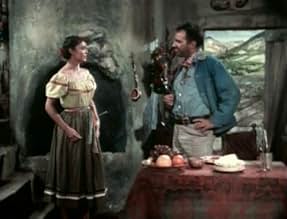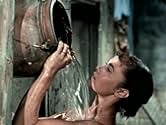If for the first half of this drama, you can go through the typical Hollywood depiction of Mexico and its people (dancing flamenco and shouting "Olé"), you will enjoy this tale of greed and treason among common folks, related to one another in different ways. Never mind the mixture of Spanish elements with the Mexican: the description of Mexican culture (which is key to the story, though not essential) is not even offensive, but plainly cheap, funny and sometimes embarrassing for the cast, although Charlita seems to enjoy every minute of her part as a kind of Tongolele lost in a dusty cantina. Since the central plot is interesting enough by itself, we can overlook all the kitsch, for what is being told is universal: how human beings can become negative from one moment to the next, by ambition and lust for material possession. All the three leads are quite effective. I really had never seen Arthur Kennedy so good in a role, practically having the whole film on his shoulders; beautiful Betta St. John is a bit out of range in her dramatic scenes, but she is more convincing here than in those Tarzan movies with Gordon Scott; while Eugene Iglesias is intense enough to suggest the emergence of a lout in less than half a day. As in all of Edgar G. Ulmer's films, no matter how big or small the budget, the visuals are good. The ingredient I enjoyed the less was the proto-Morriconesque score by composer Herschel Burke Gilbert, who could have benefited by going to Plaza Garibaldi in México City and have some tequila and tacos, sing with a mariachi band, and listen to rancheras and other typical Mexican musical forms.


























